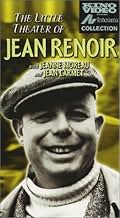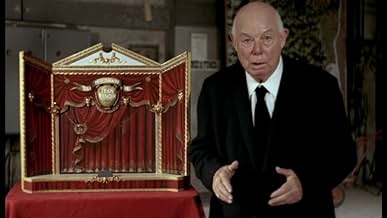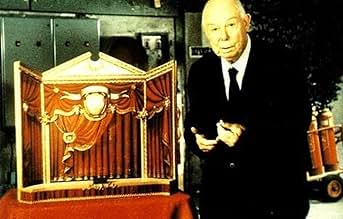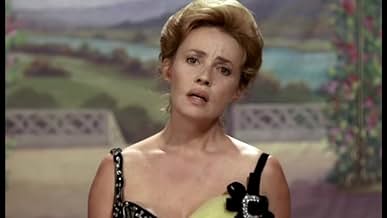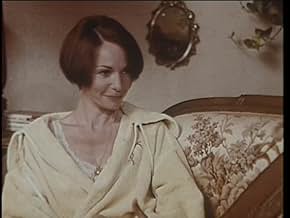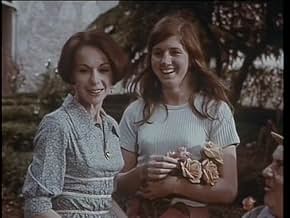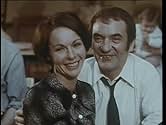Le petit théâtre de Jean Renoir
- Película de TV
- 1970
- 1h 40min
Agrega una trama en tu idiomaMade for television, this film consists of four parts: Part One, "The Last Christmas Dinner," is about the relationship between an old man and an old woman, both homeless. Part Two, "The Ele... Leer todoMade for television, this film consists of four parts: Part One, "The Last Christmas Dinner," is about the relationship between an old man and an old woman, both homeless. Part Two, "The Electric Floor Polisher," is an opera-like story of a woman who is obsessed with polishing he... Leer todoMade for television, this film consists of four parts: Part One, "The Last Christmas Dinner," is about the relationship between an old man and an old woman, both homeless. Part Two, "The Electric Floor Polisher," is an opera-like story of a woman who is obsessed with polishing her floors. Part Three is a musical interlude featuring Jeanne Moreau singing "When Love Die... Leer todo
- Dirección
- Guionista
- Elenco
- La clocharde
- (as Milly Monti)
- …
- Un amoureux
- (as Claude Guillaume)
- …
- Dirección
- Guionista
- Todo el elenco y el equipo
- Producción, taquilla y más en IMDbPro
Opiniones destacadas
Renoir, throughout his career, had a theme of disdainful satire for the upper classes and public opinion running through many of his movies. This final work of his continues the theme. If it is not among his great works, it still shows the same attitudes, a pleasant and mildly, disdainful sense that it is better to be happy than depend on the opinions of others.
Perhaps it is therefore ridiculous to offer an opinion of this last offering, or indeed any other. But I had a good time watching this sunset work.
A film made up of sketches,which was more his colleague Julien Duvivier's field.This is a spotty minor work.The director himself appears (but he does not play ,as he did,in notably "la Règle du Jeu" ) and presents,a la Sacha Guitry ,his stories and his actors.The presence of a theater in miniature is not unlike the beginning of his 1931 masterwork "La Chienne" .
Segment one:"Le Dernier Réveillon" or back to Andersen;during the silent era,one of Renoir's best achievements was his stunning treatment of HC Andersen's "La Petite Fille aux Allumettes" .This short is a modern update of the tale.Average.
Segment two:"La Cireuse Electrique" or down with modern technology!This sketch is marred by frequent appearances of a (Greek?) chorus singing appalling tunes ,recalling the worst musical parts of René Clair's comedies of the early thirties such as "Le Million".And however the sketch -you can use your fast forward button for the "songs"- is probably the best of the lot.Marguerite Cassan is very funny as the perfect housewife (a Stepford one?) whose only love seems to be her floor,and whose only desire is to own a floor polisher.When her hubby comes back from work with a promotion,her only thought is that being richer,they can afford that domestic appliance.
Actually the segment displays Renoir's disgust for modern life ,for new ideas (also blatant in the first sketch),for revolution (this was made two years after 1968).It's surprising that the same man did "La Chienne" "Boudu Sauvé des Eaux" or "Le Crime de Monsieur Lange" .
Segment three : "Quand l'Amour Meurt" or Intermezzo.Jeanne Moreau sings one song .Not really exciting.
Segment four: "Le Roi D'Yvetot" or back to Marcel Pagnol.In 1934,Renoir made "Toni " ,a film produced by Pagnol with the Provençal director's actors.This final segment is updated Pagnol : besides,Fernand Sardou resembles Raimu -whom Renoir never directed-,and the story revolves around Pétanque and Ménage à Trois.It never really takes off.
Although he was always praised by the Cahiers du Cinema,Renoir's decline was obvious in the sixties and "Le Petit Theatre" is finally a disappointment after such a brilliant career.
¿Sabías que…?
- ConexionesReferenced in La vida misma (2014)
Selecciones populares
Detalles
- Fecha de lanzamiento
- Países de origen
- Idioma
- También se conoce como
- The Little Theatre of Jean Renoir
- Productoras
- Ver más créditos de la compañía en IMDbPro
- Tiempo de ejecución
- 1h 40min(100 min)
- Mezcla de sonido
- Relación de aspecto
- 1.33 : 1

